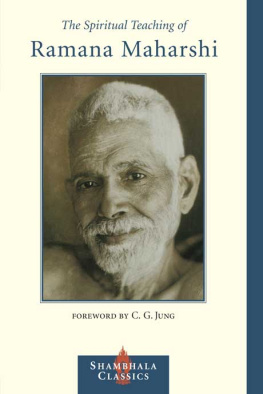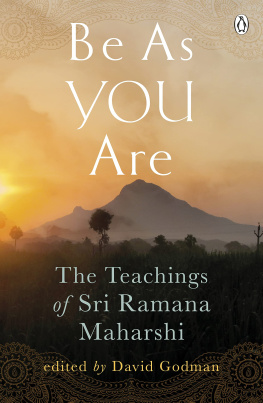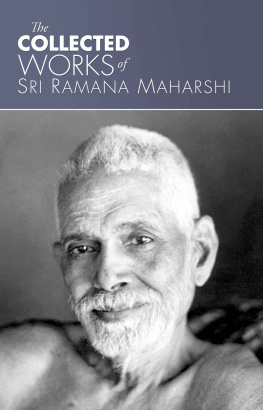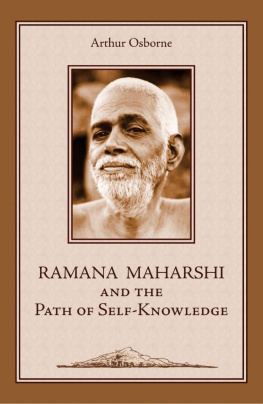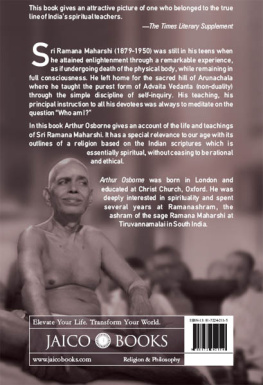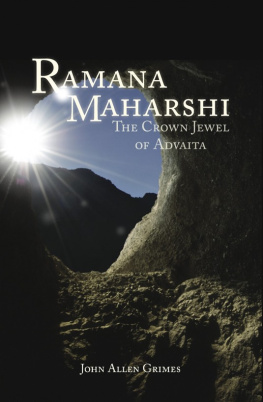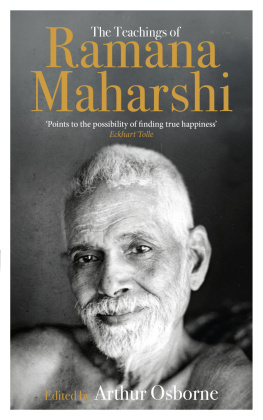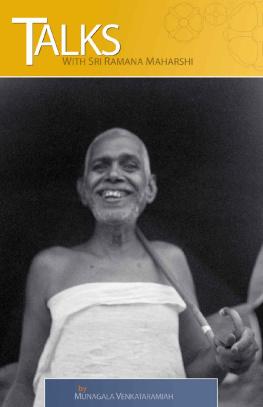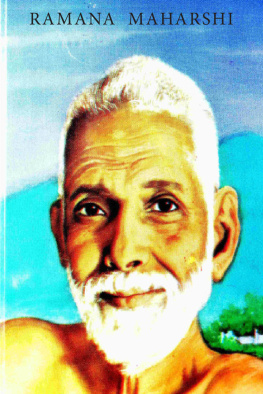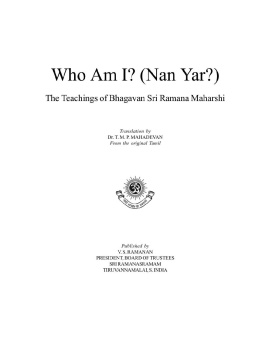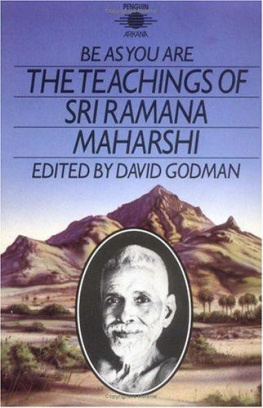ABOUT THE BOOK
The renowned Indian sage Ramana Maharshi is beloved by Buddhists, Hindus, Christians, and Taoists alike for the inspirational power of his teachings, which transcend all religious differences. Here is a collection of Sri Ramanas instructions and discourses culled from three works: Who Am I?, Spiritual Instructions, and Maharshis Gospel. These teachings are arranged by topics such as work and renunciation, silence and solitude, peace and happiness, and the discipline of self-inquiry. Reading this book, presented in question-and-answer format, evokes the feeling of being with this outstanding teacher at one of his intimate teaching sessions.
RAMANA MAHARSHI (18791950) was one of the greatest spiritual teachers of modern-day India. At the age of seventeen he attained a profound experience of the true Self. After some years of silent seclusion he finally began to reply to the questions put to him by spiritual seekers all over the world. Though he wrote little, his many conversations and verbal teachings were recorded by followers.
Sign up to receive news and special offers from Shambhala Publications.

Or visit us online to sign up at shambhala.com/eshambhala.

B HAGAVAN R R AMANA M AHARSHI
The Spiritual Teaching of
R AMANA M AHARSHI

FOREWORD BY C. G. JUNG

SHAMBHALA
Boston & London
2015
Shambhala Publications, Inc.
Horticultural Hall
300 Massachusetts Avenue
Boston, Massachusetts 02115
www.shambhala.com
Cover design by Jim Zaccaria
1972 Sri Ramanasramam
Biographical Sketch and Glossary 1998 by Shambhala Publications, Inc.
All rights reserved. No part of this book may be reproduced in any form or by any means, electronic or mechanical, including photocopying, recording, or by any information storage and retrieval system, without permission in writing from the publisher.
The Library of Congress Catalogues the previous edition of this book as follows:
Ramana, Maharshi.
The spiritual teaching of Ramana Maharshi.
1. Spiritual life (Hinduism) I. Title.
[BL1237.36.R35 1988] 294.5448 88-18220
eISBN 978-0-8348-2537-6
ISBN 978-0-87773-024-8 (pbk.)
ISBN 978-1-59030-139-5 (Shambhala Classics)
This book contains diacritics and special characters. If you encounter difficulty displaying these characters, please set your e-reader device to publisher defaults (if available) or to an alternate font.
A gently indrawn breathwith no thoughtcan bring the ecstasy of total awarenessbeyond words.
In these three books of answers to inquirers, Bhagavan Ramana Maharshi, without offending common sense, reason or logic, has come as close as possible to saying the unsayable and points the wayinnumerable waysfor You to find the Self and Be.
To Understand the Ultimateexperience must be Intimate.
Beyond that which you think is that which you are. Realizing this does not involve specific practices or attitudes other than Understanding. No withdrawal is necessaryno change of present time, place or conditiononly a change of viewpoint, which you bring about yourself for your Self.
A recent letter from S. S. Cohen says: Be sums up the whole practical teaching of Bhagavan. There is nothing in the material life to compensate for itneither wealth, sex, art, science nor any other ideal. It is the Greatest Goodthe bliss and truth absolute.
Bhagavan found Enlightenment for himself without a physical guru.
In these books of questions, asked and answered, may you find your answer. This can be a trip to end all trips. Find out who you are and you cant help but Be! Know that you immortal Are and you have but to Be.
May all beings be well, may all beings be happy.
Peace, peace.
PEACE
Joe & Guinevere Miller
R R AMANA AND H IS M ESSAGE TO M ODERN M AN
r Ramana is a true son of the Indian earth. He is genuine and, in addition to that, something quite phenomenal. In India he is the whitest spot in a white space.
What we find in the life and teachings of r Ramana is the purest of India; with its breath of world-liberated and liberating humanity, it is a chant of millenniums. This melody is built up on a single, great motif, which, in a thousand colorful reflexes, rejuvenates itself within the Indian spirit, and the latest incarnation of which is r Ramana Maharshi himself.
The identification of the Self with God will strike the European as shocking. It is a specifically Oriental realization, as expressed in r Ramanas utterances. Psychology cannot contribute anything further to it, except the remark that it lies far beyond its scope to propose such a thing. However, it is clear to the Indian that the Self as spiritual Source is not different from God; and in so far as man abides in his Self, he is not only contained in God but is God Himself. r Ramana is quite clear in this respect.
The Goal of Eastern practices is the same as that of Western mysticism: the focus is shifted from the I to the Self, from man to God. This means that the I disappears in the Self, and the man in God. A similar effort is described in the exercitia spiritualia, in which the personal property, the I subjugate to the highest possible degree to the possessorship of Christ. r Ramakrishna adopted the same position in regard to the Self, only with him the dilemma between the I and the Self comes a little more closely to the foreground. r Ramana declares unmistakably that the real purpose of spiritual practice is the dissolution of the I. Ramakrishna, however, shows a somewhat hesitating attitude in this respect. Though he says, As long as the I-sense lasts, so long are true Knowledge (jna) and Liberation (mukti) impossible, yet he must acknowledge the fatal nature of ahakra. He says, How very few can obtain this Union (samdhi) and free themselves from this I? It is very rarely possible. Talk as much as you want, isolate yourself continuously, still this I will always return to you. Cut down the poplar tree today, and you will find tomorrow it forms new shoots. When you ultimately find that this I cannot be destroyed, let it remain as I the servant. In relation to this concession, r Ramana is certainly the more radical.
The changing relations between these two quantities, the I and the Self, represent a field of experience which the introspective consciousness of the East has explored to a degree almost unattainable by the Western human being. The philosophy of the East, which is so very different from ours, represents to us a highly valuable present, which, however, we must obtain in order to possess. r Ramanas words once again sum up the principal things which the Spirit of India has accumulated during thousands of years in contemplation of the Inner Self; and the individual life and work of the Maharshi exemplifies once more the innermost striving of the Indian people to find the liberating original Source.
The Eastern nations are threatened by a quick disintegration of their spiritual goods, and what comes into their place cannot always be considered to belong to the best of the Western mind. Therefore, one may look upon sages like r Ramakrishna and r Ramana as modern prophets. They not only remind us of the thousands-of-years-old spiritual culture of India, but also directly embody it. Their life and teachings form an impressive warning not to forget the demand of the soul in all the new things of Western civilization and their materialistic-technical and commercial concerns of the world. The breathless impulse to obtain and possess in the political, social and intellectual fields, which is rummaging the apparent, unappeasable passion in the soul of the Westerner, is also spreading continuously in the East and threatens to bear consequences not yet to be overlooked. Not only in India but also in China, much has already been lost in which once the life of the soul lived and flourished. The externalization-culture of the West can truly clear away many evils, the destruction of which seems to be very desirable and advantageous. But, as experience has shown, this progress is bought too dearly with a loss of spiritual culture. It is undoubtedly more comfortable to dwell in a well-ordered and hygienically furnished house, but that does not answer the question as to
Next page
